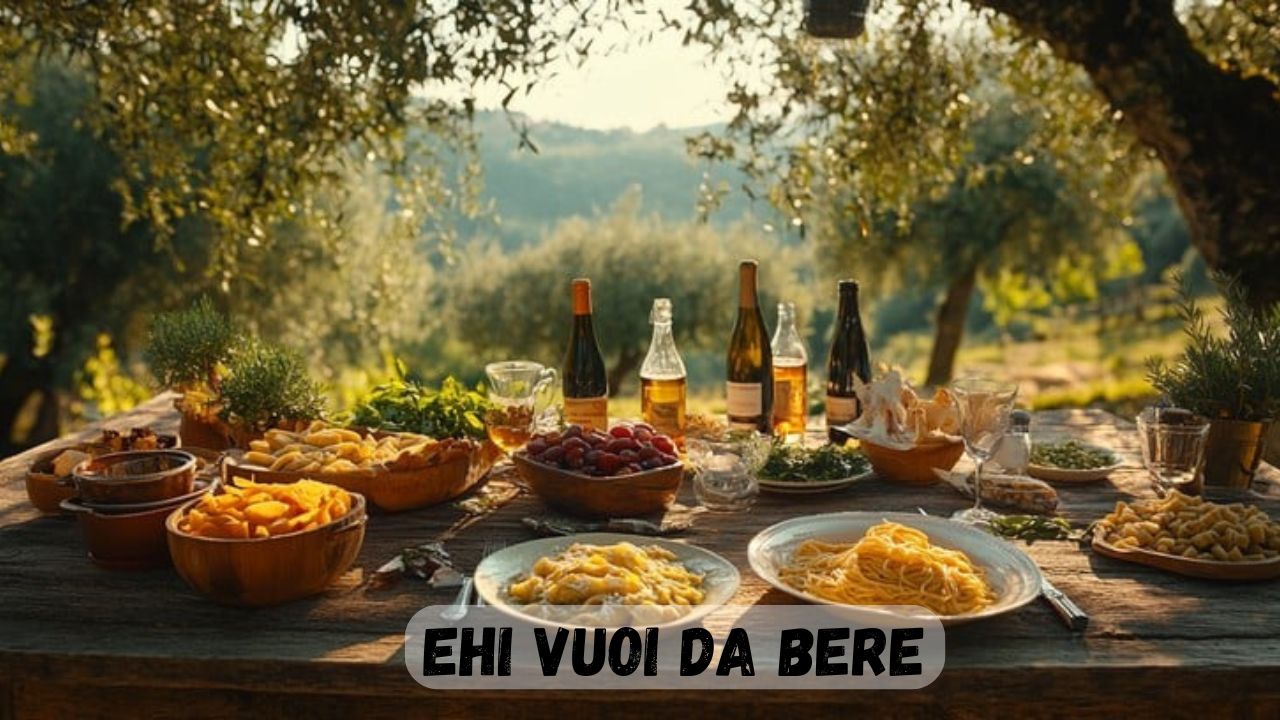I still remember the first time I heard someone say “Ehi vuoi da bere?” in Italy. It sounded simple, just a friendly question: “Hey, would you like something to drink?” (facwe.co.uk).
But it felt bigger than that. It wasn’t only about drinks. It was about opening the door—a small gesture of care, of kindness. Sometimes even a spark of friendship, or maybe romance.
| Aspect | Fact / Figure | Link to “Ehi vuoi da bere?” |
|---|---|---|
| Coffee | Italians drink 4–5 cups daily (ISTAT). | Coffee is the most offered drink. |
| Wine | Italy makes 40M+ hectoliters yearly (OIV). | Wine is central at family tables. |
| Aperitivo | 65% enjoy it weekly (Statista). | Common in bars, social life. |
| Meals & Drinks | Italians spend 2.5 hrs/day eating & drinking with others (OECD). | Shows value of togetherness. |
| Regional Styles | North = spritz/wine, South = coffee/sweets. | Explains variations like “Ti va da bere?” |
| Hospitality | Offering a drink is basic etiquette in homes. | Phrase feels automatic, welcoming. |
What Does “Ehi Vuoi da Bere” Mean?
The sentence is like a phrase but contains a lot. Unpack the sentence bit by bit.
Word-by-Word Breakdown
- Ehi → “Hey”. Used for informal calling. You use it to get the attention of somebody in an informal way.
- Vuoi → it means “do you want”. It is constructed from the verb volere (to want). Direct, simple, second person.
- Da bere → This means “to drink” or “something to drink.” It does not mention the drink. It keeps it open. It may be coffee, wine, water, anything.
Putting It Together
Assemble: “Ehi vuoi da bere?” → “Hey, would you like something to drink?”
The tone? Informal, inviting, warm. Not formal, not serious. Relaxed, like a smile in words.
Formal vs Informal
Now you know how to speak formally and informally. With best friends, you use “vuoi”. Informal, direct.
When you’re speaking to an older person, or on the formal side, you use: “Vuole qualcosa da bere?”
Same sentence, but polite. The use of vuoi instead of vuole makes the difference.
So the phrase shifts with the relationship. A word can make you talk like friends, or respectfully.
When Do Italians Use “Ehi Vuoi da Bere”?
Among Friends
Imagine you enter the home of a friend. You have not sat down yet, and they welcome you with: “Ehi vuoi da bere?” Frivolous, almost automatic. It means “I’m pleased you feel comfortable here.”
From time to time, it’s just water, sometimes coffee, sometimes wine. The drink is not the problem. The point is, you’re invited.
In Bars and Cafés
Picture yourself in a Rome café. There are a few friends; one person looks at another and asks: “Vuoi da bere?” At this stage it means “I’ll get this round.” It’s merely an act of friendliness.
In bars, sometimes it means something else. A guy will go up to a girl and say “Vuoi da bere?” — do you want a drink? Not thirst alone. It’s to get started with the chat, to lighten the mood. A little flirtation, a little teasing. The sentence is both courtesy and invitation.
At Family Meals
Italian family tables are filled with food, laughter, voices. Amidst the chaos, “Vuoi da bere?” is heard.
Maybe it’s the dad topping glasses with wine. Maybe the granny topping glasses with water. The question is not repeated twice but over and over. Making sure glasses have no gaps.
In families, “vuoi da bere” is almost tradition. It’s being hospitable, and it’s not ever obligatory.
The Cultural Importance of Hosting Refreshments
Italian drinks are not just drinks. They’re signs. A coffee in the morning. An aperitivo at night. A glass of wine at dinner. A slice of life traded for each of them.
Convivialità – Togetherness
There’s an Italian word they adore: convivialità. Togetherness. The enjoyment of being amidst people. Having a drink at hand is part of it.
When they say “Ehi vuoi da bere?” they’re not merely serving you a drink. They’re saying: “Let’s share this moment.”
Coffee, Wine, and More
Think of coffee. An Italian’s coffee isn’t caffeine. It’s community. We congregate at the bar for an espresso, quick but filling.
Picture wine at the table. It’s chat, giggles, proximity.
Comparisons With Other Cultures
Other societies do it another way. In England, it’s serving a cup of tea. In America, maybe it’s “Can I get you a soda?” In Japan, it’s serving sake to someone else before they fill the glass of the server.
Other societies do it their way. Again, in Italy, “Ehi vuoi da bere?” carries that sense of warmth, informality, and daily intimacy.
Variations of the Phrase
The expression “Ehi vuoi da bere?” is common. Familiar. But Italians have many other ways to say almost the same thing.
More Formal or Polite Options
Imagine you’re speaking to a professor. Or maybe your boss. Or even a respected elder.
In that case, you wouldn’t say Ehi. Too casual. Instead, you’d say: “Vuole qualcosa da bere?”
Notice the word vuole. It shifts the tone. Softer. Respectful. Almost like asking: “Would you care for something to drink?”
It’s still simple, but it carries weight. Courtesy wrapped in a few words.
Regional or Casual Alternatives
Italy is not one voice. It’s regions, accents, habits. In some places, people might ask: “Ti va da bere?”
It’s the same idea. But lighter. Less direct, almost a suggestion. Like saying: “Do you feel like having a drink?”
You can hear the difference. It sounds like an offer, but also a little invitation to share a moment.
Lighthearted or Comedic
With friends, the phrase bends. It becomes playful. Teasing. Sometimes even flirty.
You might hear: “Ti offro da bere solo se sorridi” → “I’ll get you a drink only if you smile.”
Or maybe: “Vuoi da bere o ti accontenti di guardarmi?” → “Do you want a drink, or is looking at me enough?”
It’s humor mixed with kindness. A little game. Proof that even the simplest phrase can carry jokes, affection, charm.
How to Respond to “Ehi Vuoi da Bere”
The question looks easy. But your reply, it tells something about you.
Accepting Politely
If you want to say yes, keep it short: “Sì, grazie.” → “Yes, thank you.”
Want it warmer? Try: “Sì, grazie, volentieri.” → “Yes, thank you, I’d love to.”
That small volentieri changes everything. It shows you’re not just accepting a drink. You’re saying: I’m glad to share this with you.
Declining Politely
Sometimes, you don’t feel like drinking. Still, you don’t want to sound cold.
So you can say: “No, grazie, magari dopo.” → “No, thank you, maybe later.”
Or softer: “No grazie, sto bene così.” → “No thanks, I’m fine like this.”
Both polite. Both leave the door open for later.
Reversing It
Hospitality in Italy often runs two ways. Someone offers you a drink, and you can return it.
You simply say: “E tu, vuoi da bere?” → “And you, do you want something to drink?”
It’s not just words. It’s a mirror. You’re saying: I see your kindness. Let me give it back to you.
Symbolism in Films, Songs, and Everyday Life
The phrase doesn’t just live in kitchens or cafés. It travels. It’s part of the culture.
In films, “Vuoi da bere?” often opens the scene for something bigger. Not about thirst. About connection. A drink as excuse for a glance, a smile, maybe romance.
In songs, Italian artists mention coffee, wine, drinks. But they mean more. They mean nights spent together. Jokes shared. The warmth of staying up too late with people you love.
And in daily life, the phrase is everywhere. At parties. Around family tables. In crowded bars. So ordinary that Italians hardly notice it.
But if you’re a stranger? It feels different. Charming. Warm. Inviting. Like Italy itself, wrapped into a simple question: “Ehi vuoi da bere?”
Conclusion
In the end, “Ehi vuoi da bere?” is more than a phrase. It’s a doorway. A small question that carries hospitality, respect, humor, even a little romance.
We saw how it shifts with tone vuoi for friends, vuole for formality, playful twists for laughter.
We learned when Italians use it at the family table, in bars, among friends and why it matters so much in their culture of convivialità. The outcome is simple yet powerful: a drink becomes a bridge. It connects people, softens distance, starts conversations.
That’s the real reason this phrase lives everywhere in homes, in songs, in films, in daily life. Because it is not about thirst at all. It is about saying: I see you, I welcome you, I want to share this moment with you.








